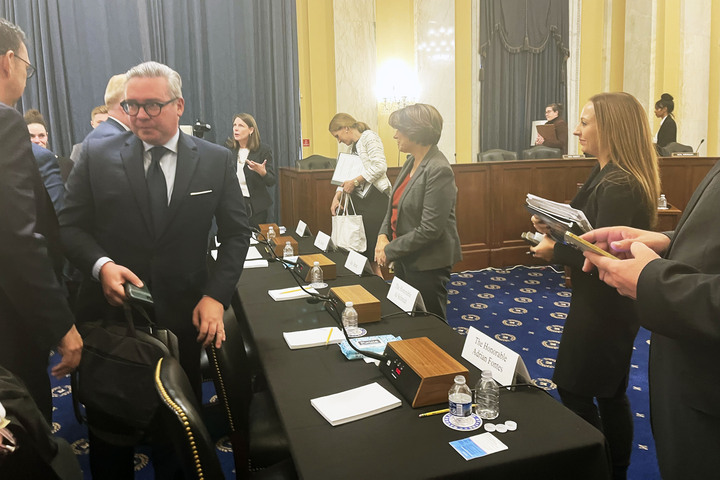WASHINGTON — Election officials from Arizona, Nebraska, Pennsylvania and Tennessee urged lawmakers on Wednesday for more federal funding so that local and state governments have the resources to conduct fair and safe elections on local and national levels.
The testimony came during a hearing held by the Senate Committee on Rules and Administration to examine the increased threats to election workers’ safety and high turnover rates in election offices. The committee also focused on the influence of artificial intelligence and the cyber security threat it poses in upcoming elections.
Sen. Amy Klobuchar (D-Minn.), chair of the committee, has two proposed bills — the Freedom to Vote Act and the Election Worker Protection Act — that aim to reform federal election standards. She said conducting safe elections is a bipartisan issue.
“Public servants who have been threatened over the last few years come from red to blue to purple states,” she said. “They are Democrats and Republicans. Many are volunteers, and they are essential to the administration of our free and fair elections.”
Dedicated election workers have become the targets of threats as a result of the spread of disinformation — sometimes by elected officials — on how elections are conducted, said Al Schmidt, the Secretary of the Commonwealth of Pennsylvania.
In Pennsylvania, 70 county election directors or assistant directors in 40 of 67 counties have left their positions since January 2020. Since then, the state has passed reforms, such as providing voter-verifiable paper records and performing risk-limiting audits, but the increase in high turnover rates are a cause for real concern, he said.
“The consequences of that are sometimes on display,” he said. “We have people conducting elections with less experience. They are more likely to make errors, and errors in an environment where everything is perceived as intentional and malicious to help change the outcome of the election, even though it is really a question of the lack of experience.”
Schmidt, who testified before this committee in 2021 after receiving threats to his personal security and his family’s safety, said the committee’s revision of the Electoral Count Act last year was a step in the right direction. It removed ambiguities on whether electors are certified and votes are tallied and passed 14-1.
Still, there is a lot of work to be done.
Sen. Laphonza Butler (D-Calif.) referenced a case in Shasta County, California, during the 2020 election where election workers received threats of being lynched and shot, and discovered a camera near the election office on election day. Butler said she supported California’s decision to pass legislation that allowed election workers to keep their home addresses confidential.
“It’s critically important to this conversation to note that, according to the Voting Rights Lab, 80% of election officials are women, and their gender identities are often a factor and a subject of their harassment and the threats that they receive,” she said.
One thing Congress can do is expand the federal prohibition against doxxing to include election workers, said Elizabeth Howard, deputy director for the Brennan Center For Justice at the New York University School of Law. This would make it a criminal penalty to expose and publicize the personal information of an election administrator for the purpose of encouraging harassment.
Not all counties have been affected by the rising level of violent threats, according to Alan Farley, an election administrator for Rutherford County in Tennessee.
He said election workers in his county do not express any fear for their lives or safety, but they do fear the looming threat AI poses to elections. Farley said his staff could be vulnerable to fishing attempts.
Rutherford County may be able to protect election workers, he said, but cybersecurity is an area where election workers need federal support.
“If you truly want to secure elections in our nation, invest federal dollars in building a stronger Information Technology structure at the local level,” Farley said. “Many counties in the state of Tennessee do not have adequate funding for county IT departments.”
While the election administrators face staffing shortages, their work continues to pile up. In recent years, counties have been receiving an increasing number of challenges to voter registrations. Sen. Jon Ossoff (D-Ga.) said there were 65,000 voter registrations challenged, described as “overwhelmingly frivolous,” in just eight counties in the lead-up to the 2022 general election.
Arizona Secretary of State Adrian Fontes said this movement poses a great threat to the foundation of democracy, and the federal government needs to act. In his state, 80% of counties have lost their lead election official in the last three years.
“You wouldn’t want to underfund the dam that you live half a mile downriver from when you live at the bottom of the valley,” he said. “You wouldn’t want to underfund the bridge that you cross over to get to work every day on, but we are in so many ways not paying enough attention to this particular part of our democracy.”



